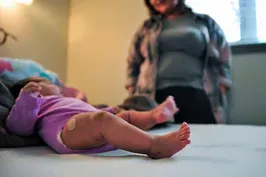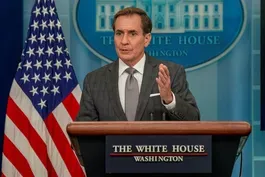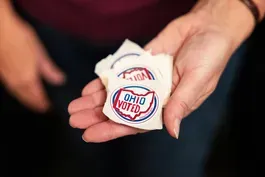
Why school board elections are garnering national attention
Clip: 11/8/2023 | 4m 51sVideo has Closed Captions
Why school board elections are garnering national attention
School board elections have become a new battleground in American politics, with typically non-partisan races becoming increasingly polarized and garnering national attention. That was true in this week's election among a few closely watched counties. Julie Marsh, a professor of education policy at the University of Southern California, joins Geoff Bennett to discuss.
Problems with Closed Captions? Closed Captioning Feedback
Problems with Closed Captions? Closed Captioning Feedback
Major corporate funding for the PBS News Hour is provided by BDO, BNSF, Consumer Cellular, American Cruise Lines, and Raymond James. Funding for the PBS NewsHour Weekend is provided by...

Why school board elections are garnering national attention
Clip: 11/8/2023 | 4m 51sVideo has Closed Captions
School board elections have become a new battleground in American politics, with typically non-partisan races becoming increasingly polarized and garnering national attention. That was true in this week's election among a few closely watched counties. Julie Marsh, a professor of education policy at the University of Southern California, joins Geoff Bennett to discuss.
Problems with Closed Captions? Closed Captioning Feedback
How to Watch PBS News Hour
PBS News Hour is available to stream on pbs.org and the free PBS App, available on iPhone, Apple TV, Android TV, Android smartphones, Amazon Fire TV, Amazon Fire Tablet, Roku, Samsung Smart TV, and Vizio.
Providing Support for PBS.org
Learn Moreabout PBS online sponsorshipGEOFF BENNETT: School board elections have become a new battleground in American politics, with typically nonpartisan races becoming increasingly polarized and garnering national attention.
That was true in yesterday's election in a few closely watched counties.
In Loudoun County, Virginia, Democratic-endorsed candidates won a majority of seats on that county's school board.
And Democrats swept school board races in Pennsylvania's central Bucks County.
We're joined now by Julie Marsh, a professor of education policy at the University of Southern California.
Thank you for being with us.
JULIE MARSH, Professor of Education Policy, University of Southern California: Thank you for having me.
GEOFF BENNETT: And we should say that most states don't allow party affiliation in school board races.
That's certainly the case in Virginia, but political parties and affiliated groups have obviously become more involved, aggressively involved in these races.
What accounts for the strong performance among Democratic-backed candidates in so many of these school board races yesterday?
JULIE MARSH: I think it's a number of things.
I think you could argue it's been a bit of a backlash against some of the heated campaigns and reflections at school board meetings.
I think a lot of voters have gotten sort of weary, tired of talking about bathrooms, book bans, flags, pronouns.
I think perhaps the wedge issue of parents' rights may not be as powerful as some had hoped.
I think moderate groups got a lot more organized.
A couple years ago, when this was starting, I don't think that the moderate and liberal groups had really been very savvy, very involved.
I think they have grown to be that way.
GEOFF BENNETT: In yesterday's election, voters across the country pushed back on the group called Moms for Liberty.
They say they're a parental rights organization.
The Southern Poverty Law Center says that they're an extremist group.
And the organization endorsed dozens of candidates in Pennsylvania, Minnesota, North Carolina, Iowa.
All of those candidates lost.
What happened there?
JULIE MARSH: Well, it's interesting.
And this is not new.
I think, last November, we also saw a mixed bag in terms of their endorsed candidates.
I think it was less than half of the candidates endorsed by Moms for Liberty won.
So, again, money doesn't make all of the difference.
We have seen that in lots of different races up and down the ballot.
But, again, I think for some folks, Moms for Liberty doesn't speak for them.
Elections for school boards are often very low turnout.
And I think, given all of the media attention around these issues, I think we might have seen an increase in turnout.
I will be interested to see the results there.
GEOFF BENNETT: Sixteen states, as I understand it, held elections for school boards across the country.
What other trends emerged?
JULIE MARSH: Well, I mean, I think we have been seeing this happening for a little bit.
These used to be really quiet, sleepy kinds of elections, low spending, low turnout, nonpartisan.
What we have been seeing in the past couple years is a lot more spending occurring.
I mean, I think -- I heard reports the past couple weeks in Minnesota and Pennsylvania that it was about three times the usual rate of spending on some of these races.
People have become more sophisticated with their political strategies, negative ads, TV ads in places that never seen that for these kinds of elections.
I want to make the point that this is not accidental.
I mean, this is that school boards have become pawns in a broader political game here.
It's been a flash point for the culture wars.
But I think folks have seen, conservative folks have seen that they can fund and be very strategic about advancing candidates, using the parents' rights agenda, as a way to build their bench.
They're using these kind of strong emotional appeals to energize their base.
GEOFF BENNETT: Well, what effect has all of that had on significant issues that public school boards face, like teacher shortages, pandemic-related learning loss, school safety?
JULIE MARSH: This has been a distraction.
I think that we have seen effects on educators and leaders.
And the other day, I was talking to some librarians I was hearing about.
We know from polls and surveys that folks are feeling the stress that it's adding to their job.
They're leaving the profession.
I'm worried about what this might do in terms of recruiting folks.
I mean, why would you want to go into this profession, given all the stresses?
I mean, there's a chilling effect here on public engagement.
Who wants to go to a board meeting where people are screaming at each other?
Who's going to be willing to speak up?
In a lot of ways, this might be turning parents against our public schools and eroding trust that we have in our institutions of public education.
GEOFF BENNETT: Julie Marsh, a professor of education policy at the University of Southern California, thanks for your time.
JULIE MARSH: Thanks for having me.
America's top diplomat lays out vision for post-war Gaza
Video has Closed Captions
Israel's ground invasion grinds on as Blinken lays out vision for post-war Gaza (5m 11s)
Explaining the staggering rise in babies born with syphilis
Video has Closed Captions
Explaining the staggering rise of syphilis in newborn babies (5m 24s)
How the White House views Israel's military campaign
Video has Closed Captions
How the White House views Israel's military campaign (7m 15s)
Opera Philadelphia pushes forward amid financial uncertainty
Video has Closed Captions
Opera Philadelphia pushes forward amid financial uncertainty (6m 48s)
Reproductive rights drive wins for Democrats
Video has Closed Captions
Reproductive rights drive wins for Democrats, leaving clues for future elections (9m 24s)
West Bank Palestinians try to save homes
Video has Closed Captions
West Bank Palestinians try to save their homes from Israeli extremists (7m 36s)
Providing Support for PBS.org
Learn Moreabout PBS online sponsorshipSupport for PBS provided by:
Major corporate funding for the PBS News Hour is provided by BDO, BNSF, Consumer Cellular, American Cruise Lines, and Raymond James. Funding for the PBS NewsHour Weekend is provided by...

















